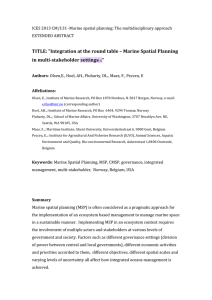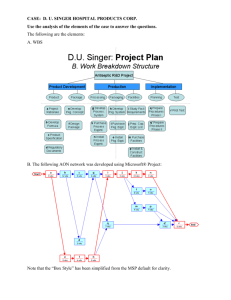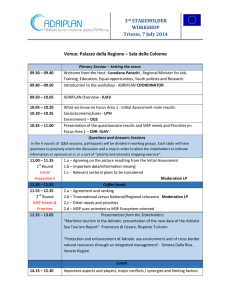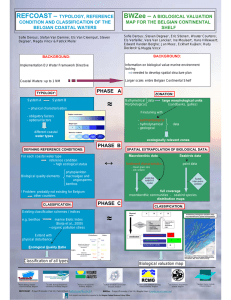A decade of marine spatial planning in Belgium: a journey... management ICES CM 2013/I:10
advertisement
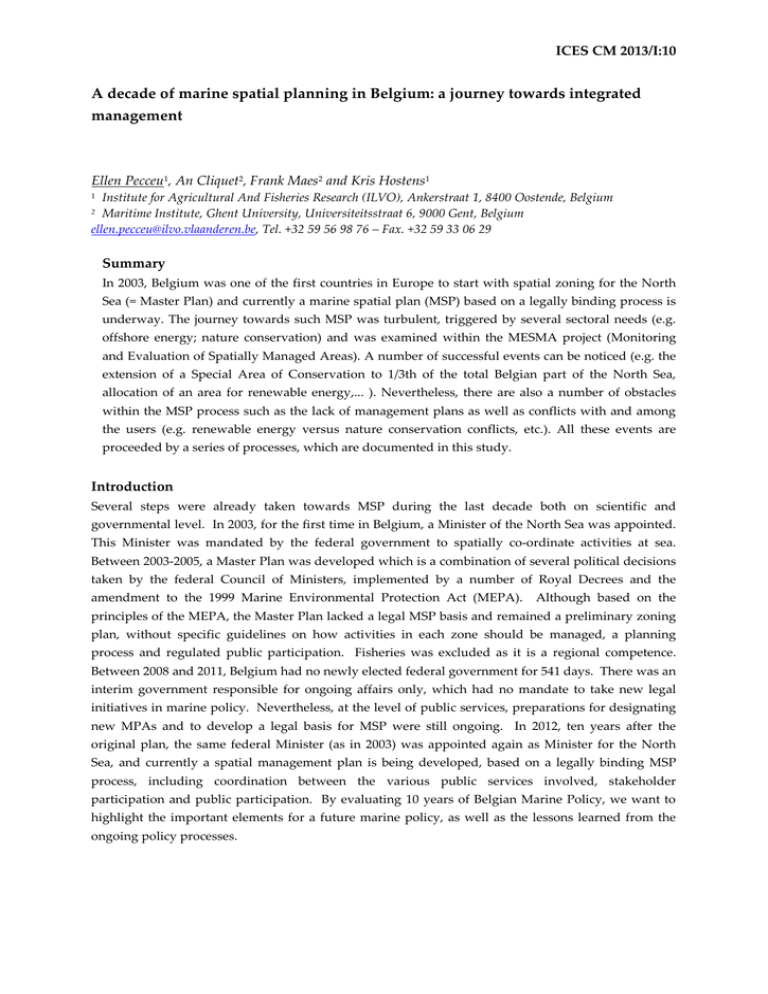
ICES CM 2013/I:10 A decade of marine spatial planning in Belgium: a journey towards integrated management Ellen Pecceu1, An Cliquet2, Frank Maes2 and Kris Hostens1 Institute for Agricultural And Fisheries Research (ILVO), Ankerstraat 1, 8400 Oostende, Belgium Maritime Institute, Ghent University, Universiteitsstraat 6, 9000 Gent, Belgium ellen.pecceu@ilvo.vlaanderen.be, Tel. +32 59 56 98 76 – Fax. +32 59 33 06 29 1 2 Summary In 2003, Belgium was one of the first countries in Europe to start with spatial zoning for the North Sea (= Master Plan) and currently a marine spatial plan (MSP) based on a legally binding process is underway. The journey towards such MSP was turbulent, triggered by several sectoral needs (e.g. offshore energy; nature conservation) and was examined within the MESMA project (Monitoring and Evaluation of Spatially Managed Areas). A number of successful events can be noticed (e.g. the extension of a Special Area of Conservation to 1/3th of the total Belgian part of the North Sea, allocation of an area for renewable energy,... ). Nevertheless, there are also a number of obstacles within the MSP process such as the lack of management plans as well as conflicts with and among the users (e.g. renewable energy versus nature conservation conflicts, etc.). All these events are proceeded by a series of processes, which are documented in this study. Introduction Several steps were already taken towards MSP during the last decade both on scientific and governmental level. In 2003, for the first time in Belgium, a Minister of the North Sea was appointed. This Minister was mandated by the federal government to spatially co-ordinate activities at sea. Between 2003-2005, a Master Plan was developed which is a combination of several political decisions taken by the federal Council of Ministers, implemented by a number of Royal Decrees and the amendment to the 1999 Marine Environmental Protection Act (MEPA). Although based on the principles of the MEPA, the Master Plan lacked a legal MSP basis and remained a preliminary zoning plan, without specific guidelines on how activities in each zone should be managed, a planning process and regulated public participation. Fisheries was excluded as it is a regional competence. Between 2008 and 2011, Belgium had no newly elected federal government for 541 days. There was an interim government responsible for ongoing affairs only, which had no mandate to take new legal initiatives in marine policy. Nevertheless, at the level of public services, preparations for designating new MPAs and to develop a legal basis for MSP were still ongoing. In 2012, ten years after the original plan, the same federal Minister (as in 2003) was appointed again as Minister for the North Sea, and currently a spatial management plan is being developed, based on a legally binding MSP process, including coordination between the various public services involved, stakeholder participation and public participation. By evaluating 10 years of Belgian Marine Policy, we want to highlight the important elements for a future marine policy, as well as the lessons learned from the ongoing policy processes. ICES CM 2013/I:10 Materials and Methods Information for this study was collected through literature studies, documentary analysis (policy notes, reports of (in)formal consultations, legislation, press reports, position papers,…), participation as independent observer and in-depth interviews with major stakeholders about the processes in the period between 2003 and 2012. Semi-structured interviews were executed with people from the governments (4), scientists (3), sector (4) and an NGO (1) in the period March- July 2012. We specifically focused on the processes of nature conservation in relation to MSP. Results and discussion Based on the analyzed processes, some important issues related to MSP can be highlighted. First of all, the progress on MSP in Belgium is a result of effective leadership and a clear political mandate. Besides the ministerial post for the North Sea, this minister had a powerful position within the federal government and he was also truly interested in marine governance, as the non-acting mayor of the largest coastal city (Ostend), with a strong electoral support. Between 2008 & 2011, with the federal governmental crisis no new legal initiatives regarding MSP were possible. In 2012, the same federal North Sea minister from 2003 was appointed again and revived the MSP process. This illustrates the importance of effective leadership and political power in the process. Stakeholder participation between 1999 and 2003 was lacking and as a consequence all initiatives (f.e. designation of MPAs) failed. For Bogaert et al.(2008) this is mainly because of lack of political will and distrust. Information was only given after protest. Since 2003, formal and informal consultation go hand in hand. Consultation was held at sectoral level and behind closed doors. Although this approach involves uncertainty for stakeholders on the decision making process, it seemed to be efficient. In addition, information meetings and public hearings were organized. The power of international legal obligations as a driving force must not be underestimated. One of the main reasons to tackle North sea issues in a more integrated manner by the Master Plan in Belgium is based on the duty to transpose European Directives. Partly thanks to the above mentioned elements (leadership, international obligations and participation), progress has been made in the policy processes which resulted in several successful designations and since mid 2012 a legally binding MSP is underway. Nevertheless, till today there is still no effective overall marine spatial management planning as described in Ehler and Douvere (2009). Clear management measures are vague or even missing; others are sectorally limited. Until now, the process is ad hoc without a focused overall long-term vision and proper integration is still largely missing. The multi-level governance structure in Belgium also hampers the marine management process. F.e. fisheries management measures fall outside the mandate of the North Sea minister since this is an exclusive regional competence. All these past experiences will have to be taken into account in the future management of the BPNS. References Bogaert D, Cliquet A, De Waen D, Maes F. The delimitation of marine protected areas in Belgium. An Analysis of the Decision Making Process, in Bogaert D, MAES F. (eds.), Who Rules the Coast. Policy Processes in Belgian MPAs and Beach Spatial Planning, Antwerpen, MAKLU, 2008; 59-105. Ehler C and Douvere F, Marine Spatial Planning: a step-by-step approach toward ecosystem-based management. Intergovernmental Oceanographic Commission and Man and the Biosphere Programme. IOC Manual and Guides No. 53, ICAM Dossier No.6. Paris: UNESCO 2009


